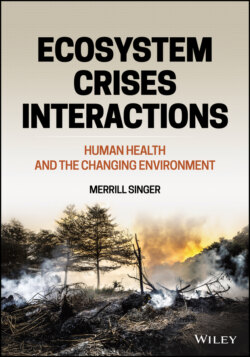Читать книгу Ecosystem Crises Interactions - Merrill Singer - Страница 10
Preface
ОглавлениеThis book appears at a moment in which leading climate scientists from around the world are warning that, if nothing else changes, there are only about a dozen years for global temperature to be kept at a level beyond which, even if it rises by only half a degree, there will be a significant worsening of the health and social impacts of drought, floods, extreme heat, ecosystem destruction, and poverty for hundreds of millions of people. Earth will not end, but for people around the planet, life as we know it today will be history. This dire warning that urgent and unprecedented changes are needed to avoid catastrophe was issued in a landmark report by the UN Intergovernmental Panel on Climate Change in 2018. This report does not stand alone; rather, the pace of critical findings on the effect of human‐caused climatic and other environmental changes is accelerating. In my online news feed, I regularly find new articles affirming that we are at a critical juncture, a consequential threshold for humans and other earthlings.
Of special concern in this volume is the issue of ecocrises interaction: the fact that not only do we face a litany of negative environment changes, but these changes are made worse through interface. Put simply, 1 ecocrisis + 1 ecocrisis results in more adverse outcomes than the additive effects of 1 + 1 because of interaction. For example, the loss of coral reefs, the most biodiverse marine ecosystems in the world, upon which millions of people depend for their food and livelihoods, is being driven by the enhanced interacting effects of warming oceans, absorption of carbon dioxide into those oceans, overfishing, and water pollution. Interaction of these stressors severely compromises the ability of corals to grow, reproduce, and thrive. As a result, as much as one‐third of all reef‐building corals are currently at grave risk of extinction. Nor are corals alone in this; numerous ecosystems that are critical to human populations are confronted by similar risk from interacting stressors of human origin.
Thus, interacting ecocrises constitute one of the most serious threats to health around the globe. These pressures come in the form of flooding, heat stroke, loss of food sources and production, spread of infectious diseases, and enhanced armed conflict. Efforts to address environmental risk have been stymied by a business‐as‐usual stance among elite polluters that benefit financially from their claimed ‘right to pollute’ and the investment of some of their profits in the organized denial of climate change and environmental disruption. However, this corporate strategy, which has been supported through lobbying for government inaction, is meeting a growing popular resistance around the world, especially among youth. This book, which provides a detailed examination of all of these issues, is intended to arm readers with the knowledge required to make vital decisions about the kind of world Earth will be over the coming decades.
